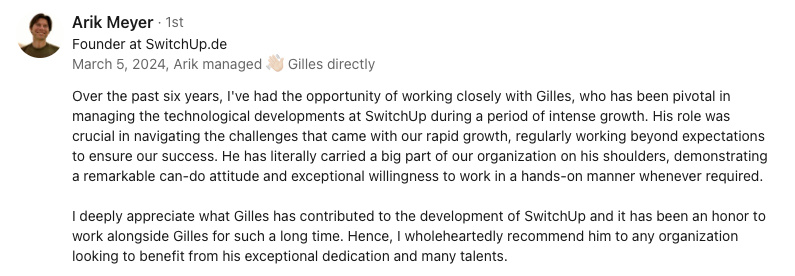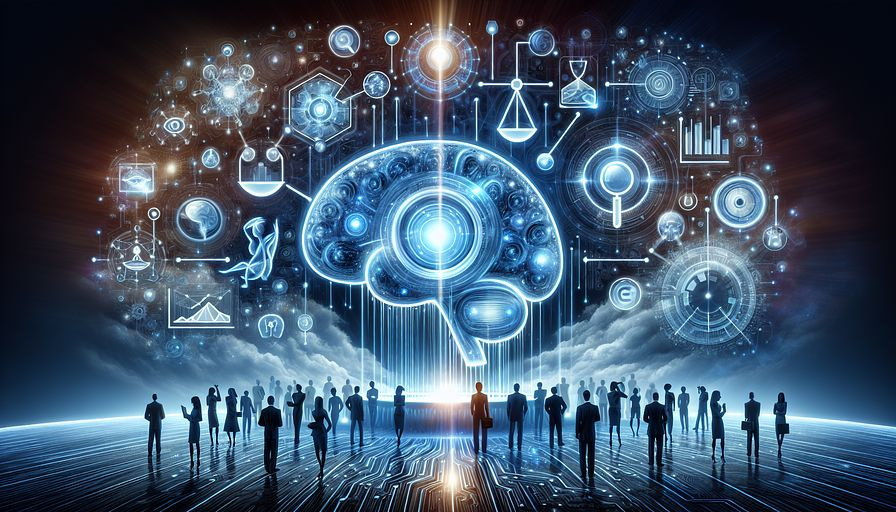Abstract:
As the workplace transforms, the demand for new skills is more pronounced than ever. This shift is not solely about mastering the latest technologies but also about honing soft skills that will stand the test of time. Critical thinking, emotional intelligence, and the ability to collaborate effectively are becoming increasingly important. At the same time, digital literacy, a solid grasp of AI and automation, and adaptive learning capabilities are becoming basic necessities for the future workforce. This article explores the essential skills that professionals must develop to thrive in the evolving work environment. It highlights the dual importance of staying abreast with technological advancements while also cultivating timeless soft skills, ensuring future-proof careers in an unpredictable global job market.
Introduction to the transformation of the workplace
The workplace is undergoing a significant transformation, driven by technological advances and the need for new skills. To thrive in this changing environment, it is essential to acquire both technical abilities and timeless interpersonal skills. Mastering technology is crucial, but equally important is the development of emotional intelligence, critical thinking, and the ability to collaborate. These competencies are shaping the next horizon of professional life, where success hinges on a balanced skill set. By focusing on continuous learning and adaptability, individuals can stay ahead of the curve and navigate the complexities of the future workplace with confidence.
The rise and importance of critical thinking
Critical thinking has emerged as a vital skill in the modern workplace, particularly as technology continues to progress. The ability to analyze complex issues, weigh options, and make informed decisions is indispensable for today's professionals. With the constant influx of information and the dynamic nature of work, honing this capability can lead to more effective problem-solving and innovative solutions.
Why is critical thinking important? First and foremost, it enables employees to tackle challenges efficiently. When faced with a problem, a critical thinker considers multiple angles, evaluates evidence, and determines the best course of action. This thorough approach results in more sound and reliable outcomes.
Furthermore, critical thinking fosters creativity. By questioning assumptions and exploring possibilities, individuals can develop unique and effective strategies. This creativity is particularly beneficial in roles that require innovation and the development of new products or services.
Developing critical thinking skills
- Ask open-ended questions: Encourage curiosity by asking questions that require deeper thought and understanding.
- Evaluate evidence: Look at data and information critically, assessing its validity and relevance before drawing conclusions.
- Reflect on biases: Be aware of personal biases and strive to consider different perspectives objectively.
By prioritizing critical thinking, individuals can greatly enhance their decision-making abilities and overall performance in the workplace. This skill not only leads to better outcomes but also cultivates a collaborative and innovative work environment.
Emotional intelligence as a key component in the workplace
Emotional intelligence (EI) plays a pivotal role in shaping team dynamics and enhancing overall productivity at work. By cultivating empathy and mastering effective communication, professionals can build stronger relationships and create a more harmonious work environment. When team members understand each other's emotions and perspectives, they can collaborate more effectively and resolve conflicts amicably.
Empathy is the cornerstone of emotional intelligence. It enables employees to connect on a deeper level, fostering trust and mutual respect. For instance, a manager who empathizes with their team's challenges can offer appropriate support, boosting morale and engagement. This genuine care helps in nurturing a positive workplace culture.
Effective communication is another crucial aspect. It involves not just conveying information clearly but also listening actively. Communicators with high EI recognize non-verbal cues and emotions, allowing for more nuanced and productive interactions. For example, addressing concerns with sensitivity and understanding can prevent misunderstandings and promote a collaborative atmosphere.
Developing emotional intelligence
- Practice active listening: Pay attention to what colleagues are saying without interrupting, and show that you value their input.
- Engage in self-reflection: Regularly assess your own emotional responses and consider how they impact your interactions.
- Empathize: Make a conscious effort to understand others' feelings and viewpoints, even if they differ from your own.
Prioritizing emotional intelligence can lead to significant improvements in teamwork and productivity. As professionals develop empathy and communication skills, they not only enhance their own performance but also contribute to a more supportive and efficient workplace.
The ability to collaborate effectively
Effective collaboration has become increasingly vital, especially with the rise of remote work environments. Strong interpersonal abilities are essential for fostering teamwork, ensuring that projects run smoothly, and achieving organizational objectives. When team members work together seamlessly, they can leverage diverse skills and perspectives, leading to more innovative and efficient outcomes.
Collaboration skills are not only about working together but also about understanding and respecting the expertise and contributions of others. This requires a blend of communication, empathy, and mutual support. For instance, in a remote setting, clear communication and active participation in virtual meetings can bridge the physical distance and create a sense of unity.
Ways to enhance collaboration
- Regular check-ins: Schedule frequent updates to ensure everyone is aligned and aware of project progress.
- Utilize collaboration tools: Leverage digital tools like project management software and video conferencing platforms to facilitate interaction.
- Foster an inclusive culture: Encourage input from all team members, valuing diverse perspectives and ideas.
Building strong collaboration skills can significantly impact a team's success. By encouraging open communication and mutual respect, teams can navigate challenges more effectively and reach their goals more efficiently. This harmonious work environment not only boosts productivity but also enhances employee satisfaction and morale.
Digital literacy in the contemporary work landscape
Digital literacy is becoming increasingly crucial for professionals aiming to stay relevant and competitive. Mastering digital tools and maintaining a polished online presence are essential components of this skill. As technology continues to advance, understanding digital platforms and tools is indispensable for day-to-day tasks. This includes everything from basic computer skills to the ability to navigate complex software and systems.
Beyond technical skills, maintaining a professional online presence is equally important. In today's job market, potential employers and colleagues often form first impressions based on online profiles and digital content. A well-curated LinkedIn profile, for example, can significantly enhance your professional image and open up new career opportunities.
Building digital literacy
- Engage with online learning platforms: Utilize resources offering courses in software and technology to keep your skills up to date.
- Maintain a professional online profile: Regularly update your social media and professional networking profiles to reflect your latest achievements.
- Explore new tools: Experiment with different digital tools and software to enhance your proficiency and adaptability.
Prioritizing digital literacy not only boosts individual performance but also contributes to overall workplace efficiency. As more tasks and communications move online, being proficient in digital tools and presenting a professional online persona are key to thriving in the contemporary work environment.
Understanding and leveraging AI and automation
Grasping the essentials of AI and automation is becoming increasingly vital for contemporary professionals. These technologies are revolutionizing job roles, streamlining operations, and shaping the future work landscape. To make the most of AI and automation, it's crucial to develop a clear understanding of how they can be integrated into daily tasks and overall business strategies.
Why is this knowledge important? For starters, AI and automation can greatly enhance productivity by handling repetitive tasks, allowing employees to focus on more complex and creative endeavors. For example, in the manufacturing industry, automated systems manage quality control with precision, reducing errors and improving efficiency.
Moreover, these technologies offer valuable insights through data analysis, enabling companies to make informed decisions. In the healthcare sector, AI-driven tools analyze patient data to predict health trends and personalize treatment plans, demonstrating the profound impact of AI on various fields.
Leveraging AI and automation effectively
- Continuous learning: Stay updated with the latest advancements in AI and automation through online courses and industry publications.
- Practical application: Experiment with AI tools and automation processes in your workplace to identify areas for improvement.
- Collaborate with experts: Work alongside AI specialists to better understand the practical implications and benefits of these technologies.
Embracing AI and automation not only boosts individual career growth but also enhances organizational efficiency. By continually learning and exploring practical applications, professionals can unlock the full potential of these advancements, driving innovation and success in their respective industries.
The role of adaptive learning in career development
Adaptive learning and constant education have become crucial for career growth. In a rapidly changing job market, staying ahead means continuously upgrading your skills and knowledge. This dynamic approach to learning not only helps professionals keep pace with new developments but also enhances their adaptability, ensuring they remain valuable assets to their employers.
Why is adaptive learning essential? First, it allows professionals to tailor their learning experiences to their own needs and preferences. This personalized approach ensures that individuals can focus on areas where they need the most improvement, leading to more effective and targeted skill development. For instance, an IT professional might prioritize courses on the latest programming languages, while a project manager could focus on new project management methodologies.
Furthermore, continuous education fosters a growth mindset. By consistently seeking new knowledge and skills, professionals can stay relevant and competitive. This continuous pursuit of learning not only enhances individual performance but also contributes to overall organizational success.
How to integrate adaptive learning into your career
- Leverage online courses: Utilize platforms offering courses tailored to your industry and career goals.
- Seek feedback: Regularly ask for feedback from peers and mentors to identify areas for improvement and focus your learning efforts.
- Set learning goals: Define specific, measurable objectives for skill development and track your progress.
By embracing adaptive learning, professionals can navigate their career paths with greater confidence and agility. This commitment to continuous development not only boosts personal growth but also ensures sustained success in an ever-changing job market.
Balancing technological skills with timeless soft skills
While technological skills are essential in modern careers, pairing them with enduring soft skills is key to long-term success. This balanced approach ensures that professionals are well-prepared for the challenges of an unpredictable global job market, making them both versatile and resilient.
Why is this balance important? For one, it creates a well-rounded professional profile. Possessing strong technical abilities is undoubtedly valuable, but without effective communication, teamwork, and adaptability, these skills may not reach their full potential. For instance, a software developer can be highly skilled in coding, but without the ability to collaborate with colleagues and clients, their contributions might not be fully realized.
Moreover, this equilibrium promotes ongoing learning. As technology evolves, so do the necessary technical skills. However, core interpersonal abilities like empathy, problem-solving, and leadership remain constant. A harmonious blend of these skills ensures a robust and adaptable career trajectory.
How to achieve this balance
- Pursue diverse learning opportunities: Engage in courses that enhance both technical and interpersonal skills.
- Seek feedback: Regularly request input to identify strengths and areas for improvement in both skill sets.
- Practice self-awareness: Reflect on how your technical abilities and soft skills complement each other in various situations.
Striving for a balance between technological prowess and timeless interpersonal skills empowers professionals to excel in their careers and navigate future changes with greater confidence and effectiveness.
Conclusion with actionable insights
The transformation of the workplace demands a unique blend of skills. By focusing on both technical and interpersonal abilities, professionals can effectively navigate this evolving landscape. Here are some actionable insights to help you develop the necessary competencies and thrive in your career:
Key takeaways and actionable steps
- Embrace continuous learning: Regularly update your technical skills through online courses and industry publications.
- Practice emotional intelligence: Engage in active listening, show empathy, and communicate effectively to build stronger relationships at work.
- Enhance critical thinking: Ask open-ended questions, evaluate evidence carefully, and reflect on biases to make better decisions.
- Improve collaboration: Schedule regular check-ins, utilize collaboration tools, and foster a culture of inclusivity.
- Cultivate digital literacy: Stay proficient in digital tools and maintain a professional online presence to remain competitive.
- Leverage AI and automation: Understand and experiment with these technologies to enhance productivity and efficiency in your role.
- Adopt adaptive learning: Tailor your learning experience to your needs, seek feedback, and set clear learning goals.
- Balance technical and soft skills: Engage in diverse learning opportunities and practice self-awareness to maximize your potential.
By prioritizing these insights, you can develop a balanced skill set that includes both tech-savvy and timeless soft skills. This dual approach will not only help you succeed in your current role but also prepare you for the challenges and opportunities that lie ahead in the workplace.





